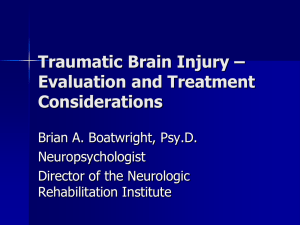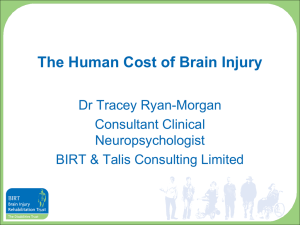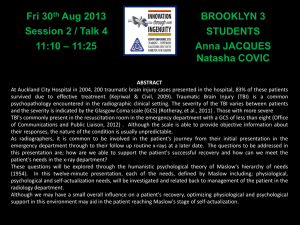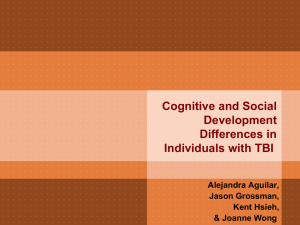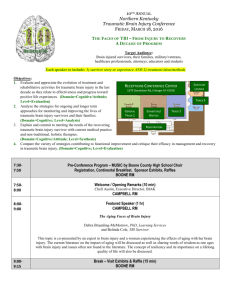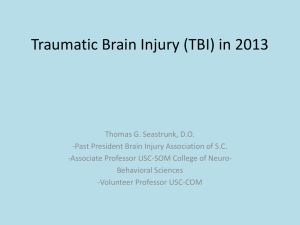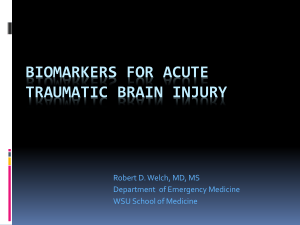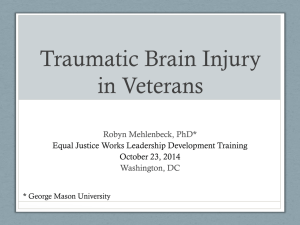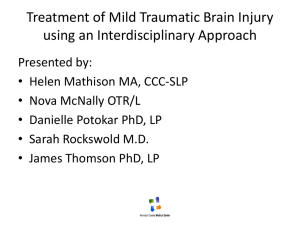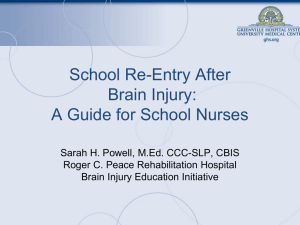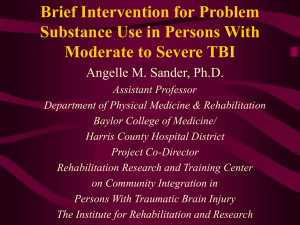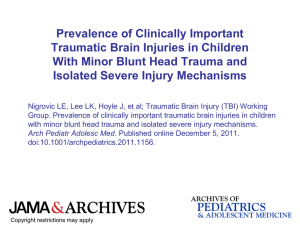Traumatic Brain Injury
advertisement
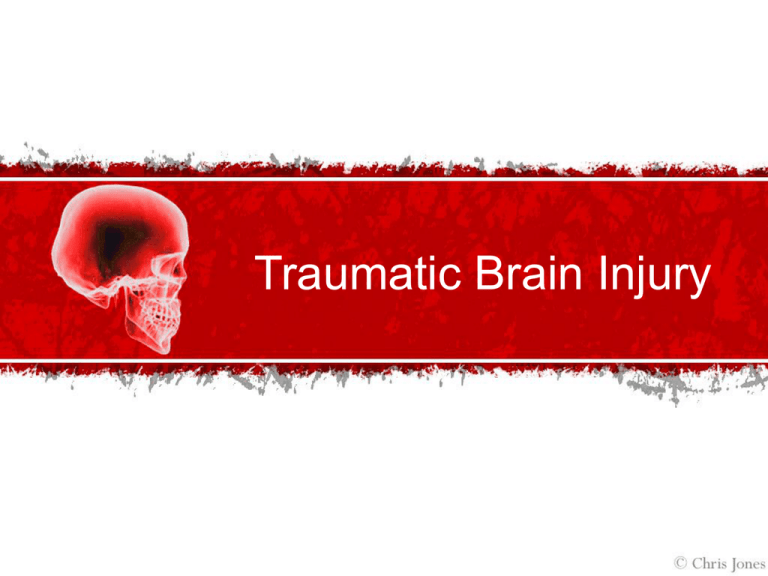
Traumatic Brain Injury Traumatic Brain Injury Defined • Traumatic Brain Injury (TBI): According to the Brain Injury Association, traumatic brain injury is an insult to the brain, not of a degenerative or congenital nature but caused by an external physical force, that may produce a diminished or altered state of consciousness, which results in an impairment of cognitive abilities or physical functioning. It can also result in the disturbance of behavioral or emotional functioning. These impairments may be either temporary or permanent and cause partial or total functional disability or psychosocial maladjustment. Acquired Brain Injury • Acquired Brain Injury (ABI): Most symptoms of acquired brain injuries are very similar to that of traumatic brain injuries; however, there are some difficulties that are experienced more frequently or to a greater degree by persons with acquired brain injuries. This information is not intended to be a substitute for medical advice or examination. Symptoms can include: • Cognitive impairment- Thinking skills, especially memory. • Longer lengths of time spent in a vegetative state. • Severe behavior problems- Psychosis, depression, restlessness, combativeness, hostility. • Muscle movement disorders. Types of TBI • Diffuse Axonal Injury (TBI) • Penetrating Injury (TBI) • Concussion (TBI) • Shaken Baby Syndrome (TBI) • Contusion (TBI) • Locked in Syndrome (TBI) • Coup-contre coup injury (TBI) • Anoxic brain injury (ABI) • Second Impact Syndrome (TBI) • Hypoxic brain injury (ABI) Causes of TBI • Airway obstruction • Near-drowning, throat swelling, choking, strangulation, crush injuries to the chest • Electrical shock or lightening strike • Trauma to the head and/or neck • Traumatic brain injury with or without skull fracture, blood loss from open wounds, artery impingement from forceful impact, shock • Vascular disruption • Heart attack, stroke, arteriovenous malformation (AVM), aneurysm, intracranial surgery • Infectious disease, intracranial tumors, metabolic disorders • Meningitis, certain venereal diseases, AIDS, insect-carried diseases, brain tumors, hypo/hyperglycemia, hepatic encephalopathy, uremic encephalopathy, seizure disorders • Toxic exposure- poisonous chemicals and gases, such as carbon monoxide poisoning • Asthma attack, loss of oxygen Levels of TBI • Mild traumatic brain injury: – Loss of consciousness is very brief, usually a few seconds or minutes. – Loss of consciousness does not have to occur—the person may be dazed or confused. – Testing or scans of the brain may appear normal. • Moderate traumatic brain injury: – A loss of consciousness lasts from a few minutes to a few hours – Confusion lasts from days to weeks – Physical, cognitive, and/or behavioral impairments last for months or are permanent. • Severe traumatic brain injury (include and are not limited to): – – – – – – Coma Vegetative State Persistent Vegetative State Minimally Responsive State Akinetic Mutism Locked-in Syndrome Cognitive Characteristics • Short and/or long term memory loss. • Poor concentration . • Communication disorders related to speech, writing, and reading. • Logical reasoning, organization skills, orientation. Daily Life of TBI • Take 2 minutes to write down on a blank sheet of paper everything you have done from the time you woke up this morning to the time you walked into class. Use as much detail as you can. Daily Life of TBI • This is what the list for a person with TBI may write down. • Woke up • Brushed Teeth • Walked to class • Sat in seat “My short term goals are just remembering to brush my teeth, take my pills, eat my breakfast. Just the simple things.” –Anonymous person with TBI Psychomotor Characteristics • Slowness or confusion in the planning and sequencing of movements (ataxia, apraxia) • Muscle spasticity • Contractures, fatigue, & balance impairment. • A variety of sensory impairments, including vision and hearing loss. Affective Characteristics • Lowered self-esteem. • Lack of motivation. • Difficulty relating to others. • Impulsivity, impatience, social dependency, irritability, apathy, inability to profit from experience, changes in personality, short temper, lack of awareness of physical and/or mental limitations. Teaching Strategies • • • • PATIENCE!! Upon knowing the students TBI severity (mild, moderate, or severe), you should decided on whether or not to use inclusion or work 1 on 1 with the student. Keep in contact with the Physical Therapist if the student is currently with one. Expect the unexpected – • Allow for flexibility in the classroom if student is included with the regular physical education class – • Some students who have suffered TBI have gone through seizures. Differentiated instruction may be geared towards this student if not the entire class Students may need adaptive equipment for the classroom, sometimes the equipment is not easy to deal with as they can be large and difficult to maneuver for both you and the student. – Stand up wheelchair as seen at right TBI Rehabilitation Interesting Facts about TBI • IT CAN HAPPEN TO ANYONE! • Every 16 seconds, one person in the US sustains a Traumatic Brain Injury. • An estimated 3.17 Million Americans currently live with disabilities resulting from Traumatic Brain Injury. • 1.4 Million Americans sustain a Traumatic Brain Injury each year. • More than 50,000 people die every year as a result of Traumatic Brain Injury. • Males are two times more likely than females to sustain a brain injury. • The highest rates of brain injury typically occur in males ages 15-24. • Individuals who have already sustained a brain injury are also at an increased risk of sustaining another brain injury. Resources • • • • • http://www.biausa.org/education.htm http://www.twu.edu/inspire/Aquatic/TBI.htm http://www.youtube.com/watch?v=BwIOF98rbMo http://www.neurologychannel.com/tbi/symptoms.shtml Marion, Donald W. Traumatic Brain Injury Thieme Publishing • Winnick, Joseph P. (2005) Adapted Physical Education and Sport Champaign, IL Human Kenetics • Stoler, Diane Roberts & Hill, Barbara Alberts Coping with Mild Traumatic Brain Injury Alberts Publishing
